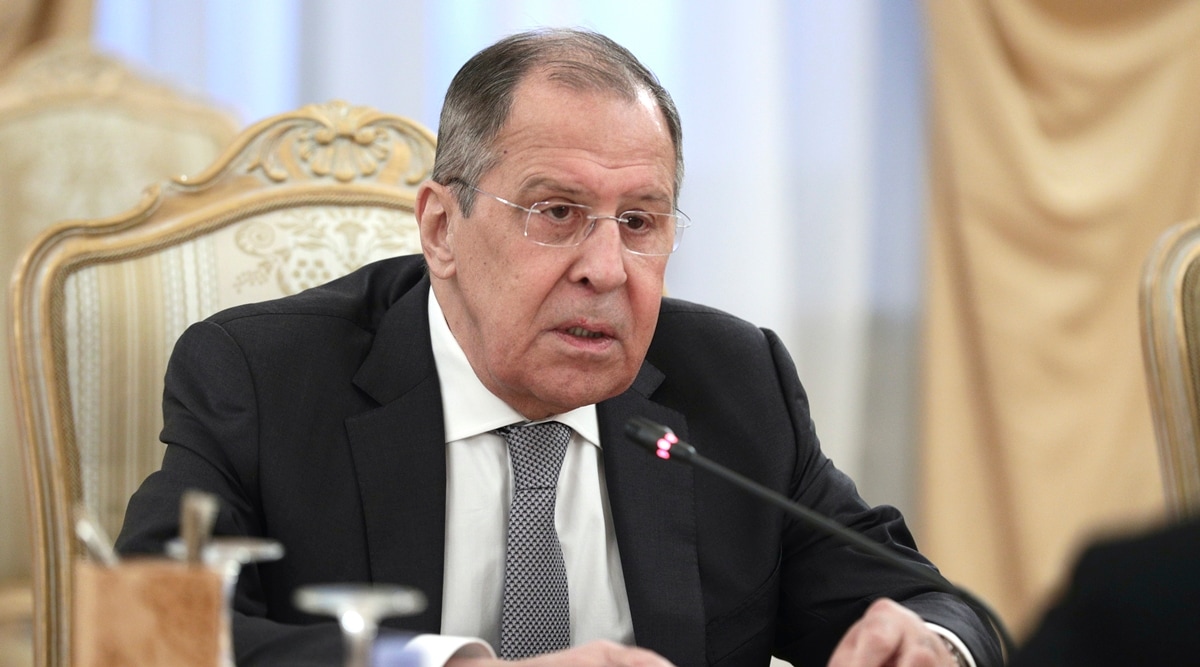The West is also seeking to “undermine” Russia’s close partnership and privileged relationship with India, Russia’s Foreign Minister Sergey Lavrov said.
In a scathing comment on the Quadrilateral (Quad) grouping, Russia’s Foreign Minister Sergey Lavrov has described India as an “object” of the West’s “persistent, aggressive, and devious” policy against China in the Indo-Pacific.
The West is also seeking to “undermine” Russia’s close partnership and privileged relationship with India, Lavrov said.
“This is the goal of the US’s very tough pressure on New Delhi in the MTC (Military Technical Cooperation) area,” he said at the general meeting of the Russian International Affairs Council on Tuesday. The remarks were released on Wednesday.
While this is not the first time that the Russian minister has criticised the Quad – the strategic forum of the United States, Japan, Australia and India – the strong language, and the reiteration of the criticism after External Affairs Minister S Jaishankar attended the Quad Foreign Ministers’ meeting in Tokyo in October, raises questions.
The Ministry of External Affairs did not issue an official response to the comments by the Russian Foreign Minister, there is a perception in New Delhi that Moscow’s concerns are an outcome of it’s proximity to Beijing.
“Obviously, the West is trying to restore the unipolar model of world order,” Lavrov said. “‘Poles’ like Russia and China are unlikely to be subordinate to it. However, India is currently an object of the Western countries’ persistent, aggressive and devious policy as they are trying to engage it in anti-China games by promoting Indo-Pacific strategies, the so-called ‘Quad’, while at the same time the West is attempting to undermine our close partnership and privileged relations with India. This is the goal of the US’ very tough pressure on New Delhi in the military and technical cooperation.”
The West, led by the US, has launched a “game”, Lavrov said, “rejecting the objective trends towards the formation of a multipolar world”. It has “postponed Russia and China for later and is trying to draw all others into a unipolar world by any means possible. For our part, we will promote a unifying agenda,” he said.
“The G20 is the only mechanism outside the UN Security Council where it is still possible to come to terms based on a balance of interests. It represents the so-called G7, the BRICS countries and the states that sooner share the philosophy of BRICS than that of the G7 (Saudi Arabia, Mexico, Argentina, Indonesia and Egypt). The G20 is a venue where there is still hope for promoting more balanced approaches that can then be used in formal international legal structures.
“Our official contacts with the West have been frozen by the West (I will not explain why since this is common knowledge). This is the line towards the prevalence of the unipolar approach. They believe that ‘arrogant Russia’ has been ‘isolated’ and ‘punished’,” Lavrov said.
In January this year, Lavrov had questioned the alleged US double standards of championing a “rules-based world order” while violating international law itself, and criticised the concept of Indo-Pacific as being only about the containment of China.
“Why do our Western friends insist on a rules-based order and not international law?” he had asked during the first ministerial keynote address at Raisina Dialogue 2020, the annual conference on strategic affairs backed by the MEA.
“When people say that we want to develop cooperation in Asia-Pacific in the form of Indo-Pacific strategies, you immediately ask questions. Do you include all those who have been known to be part of Asia Pacific? Yes. Why do you need to call it Indo-Pacific? You know the answer. The answer is to contain China. It is not even hidden. Indian friends are smart enough to understand this threat and not to get into it,” Lavrov had said.
Jaishankar, who spoke just after Lavrov’s session, had disagreed with his Russian counterpart on the definition of a “rules-based world order”.
“…I think of rules-based order as something which is more than (international) law, not less than (international) law”, Jaishankar had said.
Source: Read Full Article


